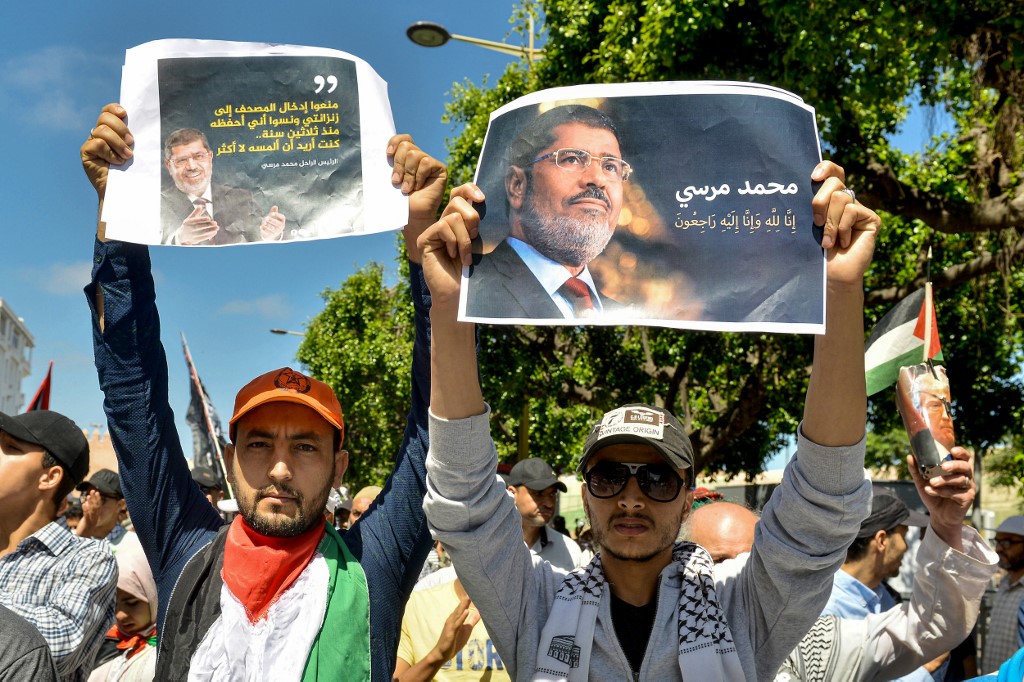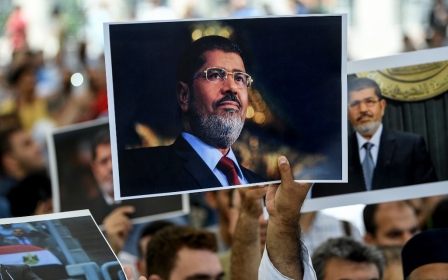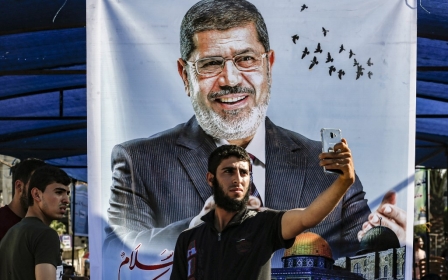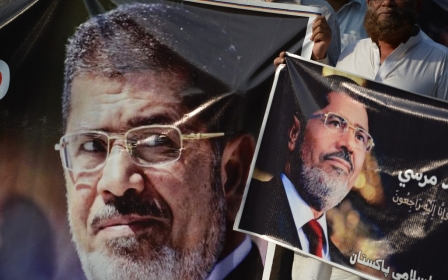How most commentators got it wrong on Morsi
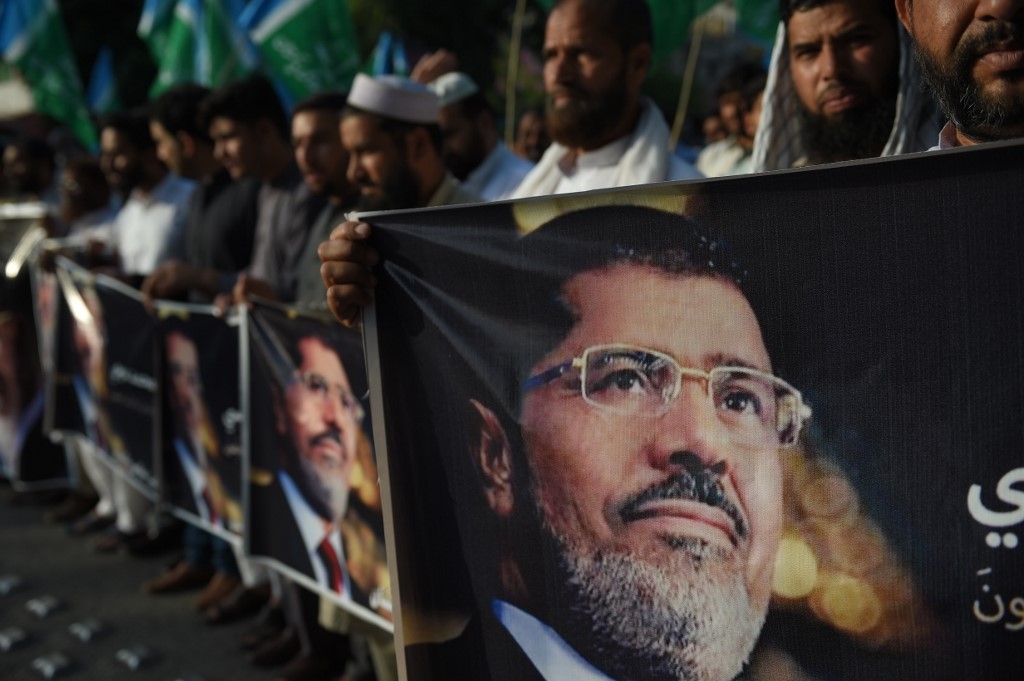
Mohamed Morsi, the only freely elected leader of Egypt throughout its 7,000-year history, died in court on 17 June.
Coverage of his death, at least outside of Egypt, was extensive. It was notable for several critical issues that must be highlighted if we are to understand the perspective of tens, if not hundreds, of millions of Egyptians, Arabs and Muslims.
Most commentators wrote as though it was still 2012. We now know far more about the circumstances of Morsi’s year in office than we knew back then. But for the vast majority of commentators, nothing seems to have changed.
Faux-protest movement
It seems not to matter that we now know that Egyptian oligarchs poured their resources into fomenting a faux-protest movement. It seems not to matter that regional powers such as Saudi Arabia, the UAE and Israel were actively promoting and planning regime change.
New MEE newsletter: Jerusalem Dispatch
Sign up to get the latest insights and analysis on Israel-Palestine, alongside Turkey Unpacked and other MEE newsletters
It seems not to matter that the Egyptian judiciary was discovered to be entirely beholden to its military masters, eager to issue rulings that violated the most basic norms of justice. It seems not to matter that, in the aftermath of the military coup, the civilian opposition showed zero commitment to democracy and absolutely no regard for human rights.
Given the pervasive critical commentary in the aftermath of his death, the average Western leader will never understand why his death was marked by people around the world
Instead, commentators still use phrases such as: “His time in office was a chaotic period,” as if the chaos was of his own creation, or a disembodied phenomenon unconnected to any of the above. There was a counterrevolution, and a powerful one at that. In most commentaries, the impact of that counterrevolution is entirely absent from the assessments of Morsi’s presidency.
Claims about Morsi’s popularity, or lack thereof, are pervasive, yet fall flat on two counts. Morsi was never as unpopular as portrayed, and comparisons with other leaders in the same period put his popularity into context. Nine months into his term, as the faux-protest movement raged, Morsi’s approval rating was 47 percent, contrary to the claims that he was deeply unpopular and must be ousted.
Polarised environment
Morsi’s approval rating remained in this range until the last few weeks of his term, dropping from 42 percent after 11 months in office to 32 percent in the last few weeks. Given the unrelenting demonisation and vilification of Morsi, it is incredible that this many Egyptians continued to approve of his performance.
Our world today is polarised, and governance - even in stable, mature democracies - is difficult, but very little consideration is given to the challenges of that polarised environment.
How do other leaders compare? This past April, French President Emmanuel Macron’s approval rating was 29 percent. His predecessor, Francois Hollande, left office with an approval rating under five percent. The UK’s Theresa May’s approval rating is around 25 percent. Her predecessor, David Cameron, having led his country into the Brexit quagmire, left office with a marginally better approval rating, at 32 percent - making him the most popular British prime minister since Margaret Thatcher.
In May 2014, 43 percent of Egyptians were opposed to Morsi’s ouster, and in September of the same year, with the Muslim Brotherhood banned and declared illegal, 43 percent of Egyptians still believed that they had a positive impact on Egypt. For the vast majority of commentators, none of this matters; Morsi was “deeply unpopular”.
Some like to repeat the pithy soundbite that Egypt needed a Nelson Mandela, and Morsi was no Mandela. Conveniently omitted from this analogy is that Mandela’s position was unaltered during 27 years in prison.
South Africa’s future changed precisely because Mandela was steadfast, not because he equivocated, and he remained on the US terrorism watch list almost until his death. As long as P W Botha or his predecessors were Mandela’s interlocutors, South Africa remained mired in apartheid, oppression and injustice. Egypt needed an FW de Klerk, and what it got was Abdel Fattah el-Sisi.
The narrative of Morsi’s legacy
The third theme that emerges from the coverage of Morsi’s legacy is the ease with which fabrications become incorporated into news. If his obituary writers are to be believed, Morsi’s government was corrupt, and run more from the Muslim Brotherhood’s guidance office than from the presidential palace.
Yet, even the Egyptian courts, such as they are, were unable to prove a single instance of corruption against Morsi after six years of trials. Morsi’s independence from the Brotherhood is now documented as a cause of chagrin for them.
Finally, perhaps the most important theme - and one that lies at the heart of all three above - is the notion of who is permitted to participate in the narrative of Morsi’s legacy. Of all the opinion pieces that were published in major outlets, I have seen only two that were authored by those close to Morsi during his year in office. The vast majority were written by critical, distant observers with little-to-no firsthand knowledge of his presidency.
Morsi’s aides and ministers are apparently the subalterns, not allowed to speak or to participate in describing the reality of that period. Morsi was not perfect, but his year in office was never as flawed as the majority of commentators portray. And, given the pervasive critical commentary in the aftermath of his death, the average Western leader will never understand why his death was marked by people around the world.
The views expressed in this article belong to the author and do not necessarily reflect the editorial policy of Middle East Eye.
Middle East Eye delivers independent and unrivalled coverage and analysis of the Middle East, North Africa and beyond. To learn more about republishing this content and the associated fees, please fill out this form. More about MEE can be found here.



